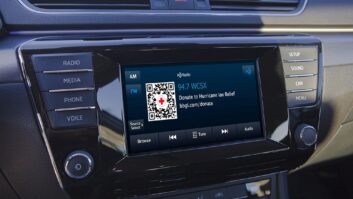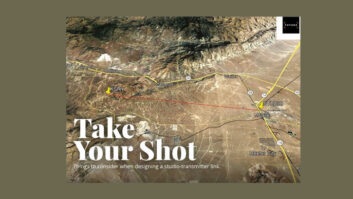WASHINGTON Some 50 commenters expressed their opinions to the FCC recently about whether to mandate HD Radio receive capability in satellite radios. The topic is the subject to a Notice of Inquiry issued by the agency as part of its decision to allow the two satcasters to merge.
Now that the deadline for initial comments to MM Docket 08-172 has passed, we get a better sense of how the affected industries are seeing the issue. Our excerpts published in the Nov. 19 issue focused mostly on satellite radio subscribers.
Here, we excerpt comments from broadcasters, engineers, Sirius XM and the auto industry.
The broadcasters filing these comments … operate 500 radio stations nationwide in markets of all sizes. Encouraged by and relying on the commission’s commitment to the public interest benefits of free, over-the-air digital radio and the commission’s commitment to rapid implementation of HD Radio, [we] have invested more than $46.3 million in developing and implementing HD Radio at their stations to date, and the radio industry has invested hundreds of millions marketing HD Radio to the listening public.
[We] believe it is critical and fully appropriate for the commission to mandate inclusion of HD Radio reception technology in all Satellite Digital Audio Radio Service receivers that are the subject of contractual relationships between Sirius XM Radio Inc. and receiver manufacturers, distributors or retailers as a condition of the recently approved Sirius XM merger. [We] respectfully submit that without the relief requested in these comments, the well-recognized benefits of HD Radio may never be fully realized, given the enhanced horizontal and vertical integration resulting from the FCC sanctioned merger of XM and Sirius. …
The commission has ample authority to condition Sirius XM’s ability to enter into contracts for the manufacture, distribution or sale of SDARS receivers upon the inclusion of HD Radio reception technology by virtue of Sirius XM being an FCC licensee. The contractual limitations advocated herein … are fully consistent with other instances in which the commission has exercised jurisdiction over SDARS licensees, most particularly the requirement initially imposed on Sirius and XM to create an interoperable receiver.
As a matter of policy, the dominant competitive position that Sirius XM now enjoys as the sole digital satellite radio broadcaster will enable, and may encourage, the merged entity to inhibit the digital conversion of terrestrial radio, thereby undermining the commission’s expressed commitment to the HD Radio rollout. Because Sirius XM is now a monopoly, the vertical integration between Sirius XM and manufacturers, distributors and sellers of SDARS receivers has been substantially enhanced.
The “voluntary commitment” accepted by Sirius XM to permit receiver manufacturers to include other technologies, including HD Radio, in SDARS receivers does not provide sufficient incentive for the development, promotion and sale of interoperable SDARS/HD Radio receivers. The “voluntary commitment” does nothing to prevent Sirius XM from using financial incentives and disincentives, including subsidies, cross-marketing and promotional arrangements, to limit the commercial introduction and success of such interoperable devices.
More specifically, Sirius XM will be able to discourage manufacturers and retailers from developing, manufacturing and selling interoperable devices by limiting subsidization or technological support to SDARS receivers that do not include HD Radio technology.
— The above joint filing was signed by Beasley Broadcast Group Inc., Bonneville International Corp., CBS Radio Inc., Clarke Broadcasting Corp., Emmis Communications Corp., Entercom Communications Corp., Greater Media Inc., Journal Broadcast Corp., Premier Broadcasters Inc. and Saga Communications Inc.
No commission action is warranted or authorized … and under no circumstances should the commission require satellite radio receiver manufacturers to include HD Radio capabilities in their devices, absent a comparable requirement imposed on HD Radio manufacturers to include satellite radio technology in HD radio receivers.
First, any commission requirement for satellite radio to include HD Radio technology is unnecessary and unwarranted. HD Radio is hardly a nascent start-up. It is an extension of AM/FM radio — an industry that dominates radio listenership. The current audio entertainment marketplace, including HD Radio, is thriving. Radio manufacturers are developing products that incorporate multiple audio entertainment functionalities, including HD Radio, satellite radio, MP3 and iPod capabilities. As the market for HD Radio and other technologies matures and consumer demand for multi-functional devices grows, receiver manufacturers will integrate a variety of audio technologies into satellite radio receivers. The commission should allow this process to respond to consumer demand.
Second, any effort by the commission to impose such a mandate on receiver manufacturers or licensees would raise radio prices and be fundamentally anticompetitive. Increasing the cost of satellite radios may be good for terrestrial radio broadcasting interests. It is not good, however, for manufacturers or consumers who may or may not want to pay for satellite radios to include that capability.
Third, the commission does not have the authority, either express or ancillary, to require satellite radio manufacturers to include certain technologies in their products. Similarly, the commission lacks authority to require satellite radio licensees to certify that receiver manufacturers include certain technologies in their devices.
— Sirius XM Radio Inc.
MEI fully supports the concept that the FCC should regulate not only transmission devices but also fully regulate the devices designed for reception of those transmission services. MEI believes that as currently written, Title I of the Communications Act gives the FCC broad discretion in all such matters. Unfortunately, the FCC has traditionally relied upon “marketplace factors” to resolve issues regarding the operation and performance of receivers. This lack of self-leadership has lead to the misconception that the FCC does not have such authority. …
Failure of government to regulate receivers encourages patent holders of new technologies, licensees, equipment manufacturers and consumer manufacturers (especially car manufacturers) to artificially manipulate the marketplace by entering into exclusive predatory deals which ultimately harm competition and thwarts the public interest by limiting consumer choices and by stifling innovative technological developments.
In the case at hand, the main difference between a satellite system and the traditional broadcast system (AM, FM, IBOC, FM-SCA, and DTV) is satellite is a subscription service and broadcasting is a free over-the-air service. … This free broadcast system is in danger of collapse, if technological barriers are permitted to be erected which artificially hampers their ability to compete. …
The mandated receivers should include minimum performance specifications. The FCC and the FAA have argued for more than 25 years about potential interference from broadcast FM facilities to the frequencies immediately above FM used by the aviation industry. …
If the decision is for the FCC to mandate receiver compatibility it should look towards some sort of Software-Defined Radio (SDR) design. This would more easily permit the retrofitting of older receivers when technologies change. …
Receivers (especially in automobiles) should provide a standard means of interface that can be used by external devices. This might also be the perfect time to incorporate a standard by which vehicle drivers can be made aware of emergency information (national and local police/fire) with or without the radio being in the On position. Such emergency capability could be accomplished with the help of WiFi and GPS.
— Mullaney Engineering Inc.
BMC takes no position on the commission’s authority to mandate that SDARS receivers include DAB. Nevertheless, should the commission determine that it does have the authority either by existing law or by future legislation, BMC urges the commission to provide for the inclusion of the LPFM, NCE and/or AM services, as proposed in the Channels 5 and 6 (76–88 MHz) spectrum, in the SDARS receivers.
— The Broadcast Maximization Committee
Alliance of Automobile Manufacturers Inc. … members oppose any action by the commission that would require the incorporation of HD Radio technology into satellite radio receivers. … The Alliance, whose members include BMW Group, Chrysler LLC, Ford Motor Company, General Motors, Mazda, Mercedes-Benz USA, Mitsubishi, Porsche, Toyota, and Volkswagen, is a trade association composed of the world’s leading car and light truck manufacturers. …
[T]he Alliance fully supports the comments jointly filed by General Motors Corp. and Toyota Motor Sales USA Inc. in the Sirius-XM merger proceeding, in which those companies state that “HD is already penetrating the automotive sector without a mandate,” and that “[s]everal manufacturers are either currently offering HD or have announced plans to make HD Radio standard or optional in future models.” The Alliance agrees that “[t]he automotive environment is extraordinarily competitive and there has been no showing in the record to support the proposition that if consumers continue to show an interest in HD technology that those manufacturers currently pursuing other entertainment strategies will not take notice and adjust their strategies.”
Second, the Alliance believes that a government mandate requiring that HD Radio features be integrated into satellite radio receivers would increase the costs to vehicle manufactures of integrating audio entertainment systems into their vehicles, thus increasing the costs to consumers. In fact, the Alliance agrees with Delphi Corp. that “undefinedntegration will drive higher costs… where the consumer has chosen either HD Radio or [satellite radio] but does not have a desire for both,” and that “[r]equiring an HD Radio system to be integrated with [a satellite radio] will unduly burden the consumer by adding significant cost to the [sale] price compared to the stand alone [satellite radio] receiver.” …
Third, given the current extraordinary contraction of the U.S. economy and lower automobile sales, imposing the additional burden of requiring the incorporation of HD Radio technology into satellite radio receivers would create an undue economic burden on the automotive industry as a whole. … [N]ew vehicle sales have dropped from an anticipated 15.6 million vehicles at the beginning of 2008 to just 11.2 million vehicles as of Oct. 15. This represents a greater than 19 percent drop in expected vehicles sales. …
While the Alliance is committed to an open and free competitive marketplace, an HD Radio mandate would represent an unprecedented level of government interference in the decisions typically made by automobile manufacturers and consumers regarding the types of entertainment technologies that are available in the automobile environment.
— Alliance of Automobile Manufacturers Inc.












